
openunivcourses
FREE ML Courses from Top Universities
Stars: 252
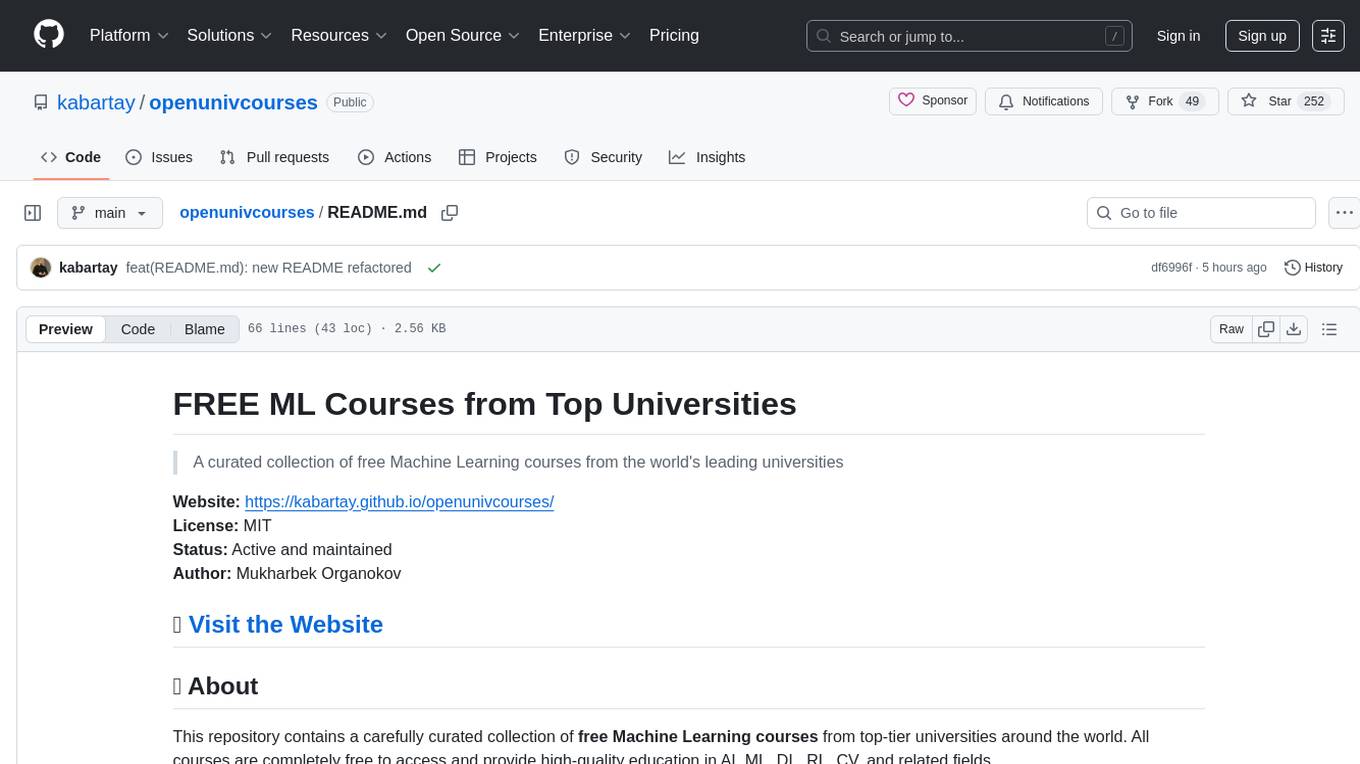
OpenUnivCourses is a repository that provides free university courses in machine learning from top universities like MIT, Stanford, Berkeley, Carnegie Mellon, NYU, University of Michigan, University of Pennsylvania, University of Chicago, Purdue, Cornell, University of Oxford, and CalTech. The repository includes a wide range of courses covering topics such as deep learning, reinforcement learning, natural language processing, and more. Users can access lectures, notes, and videos from these prestigious institutions to enhance their knowledge and skills in the field of artificial intelligence and machine learning.
README:
FREE university courses in ML from Top Universities in CS
-
Massachusetts Institute of Technology
MIT6.S191: Introduction to Deep Learning 2024 2023 2022 2021 2020
MIT6.036: Introduction to Machine Learning 2020
MIT6.S897: Machine Learning for Healthcare 2019
MIT9.520: Statistical Learning Theory and Applications YouTube 2019 2018 2017 2016 2015
MIT Deep Learning and Artificial Intelligence Lectures by Lex Fridman 2020 2019 -
Stanford University
CS236: Deep Generative Models 2023
CS234: Reinforcement Learning 2024
CS231n: Convolutional Neural Networks for Visual Recognition 2024
CS230: Deep Learning 2023
CS229: Machine Learning by Andrew Ng 2024 2023D 2023C 2023B 2022D 2022C 2022B 2021D 2021B 2020D
CS228: Probabilistic Graphical Models 2024
CS224n: Natural Language Processing with Deep Learning 2024
CS221: Artificial Intelligence. Principles and Techniques 2023D 2023C 2023B 2022D 2022B 2021D 2021B 2021A 2020D -
Berkley University
Full Stack Deep Learning 2022 2021
CS294: Deep Unsupervised Learning 2024 2020 2019
CS288: Natural Language Processing 2020
CS285: Deep Reinforcement Learning YouTube video 2020
CS189: Introduction to Machine Learning 2021
CS188: Introduction to Artificial Intelligence 2024 2023 2022 2021 2020 2019
CS182: Designing, Visualizing and Understanding Deep Neural Networks 2021
CS61B: Data Structures 2021 2020
CSC08: Foundations of Data Science 2021 2020 -
Carnegie Mellon University
11-785: Introduction to Deep Learning 2021B 2020D 2020B
10-703: Deep Reinforcement Learning 2020
11-611: Natural Language Processing 2020
10-601: Machine Learning 2015 -
New York University
DSGA1008: Deep Learning by Yann LeCun & Alfredo Canziani 2021 YouTube 2020 YouTube -
University of Michigan
EECS598-005: Deep Learning for Computer Vision 2020 YouTube -
University of Pennsylvania
CIS520: Machine Learning 2020 notes -
University of Chicago
CMSC35300: Mathematical Foundations of Machine Learning by Rebecca Willett 2020
CMSC35400: Machine Learning by Rebecca Willett & Yuxin Chen 2020
CMSC31230: Fundamentals of Deep Learning 2020 notes -
Cornell University
CS4780: Machine Learning for Intelligent Systems YouTube | notes 2018 -
University of Oxford
Machine Learning 2014
Online catalogs
MIT Open Course Ware: Computer Science Courses
MIT Open Learning Library
Stanford Online
Berkley Courses
For Tasks:
Click tags to check more tools for each tasksFor Jobs:
Alternative AI tools for openunivcourses
Similar Open Source Tools

openunivcourses
OpenUnivCourses is a repository that provides free university courses in machine learning from top universities like MIT, Stanford, Berkeley, Carnegie Mellon, NYU, University of Michigan, University of Pennsylvania, University of Chicago, Purdue, Cornell, University of Oxford, and CalTech. The repository includes a wide range of courses covering topics such as deep learning, reinforcement learning, natural language processing, and more. Users can access lectures, notes, and videos from these prestigious institutions to enhance their knowledge and skills in the field of artificial intelligence and machine learning.
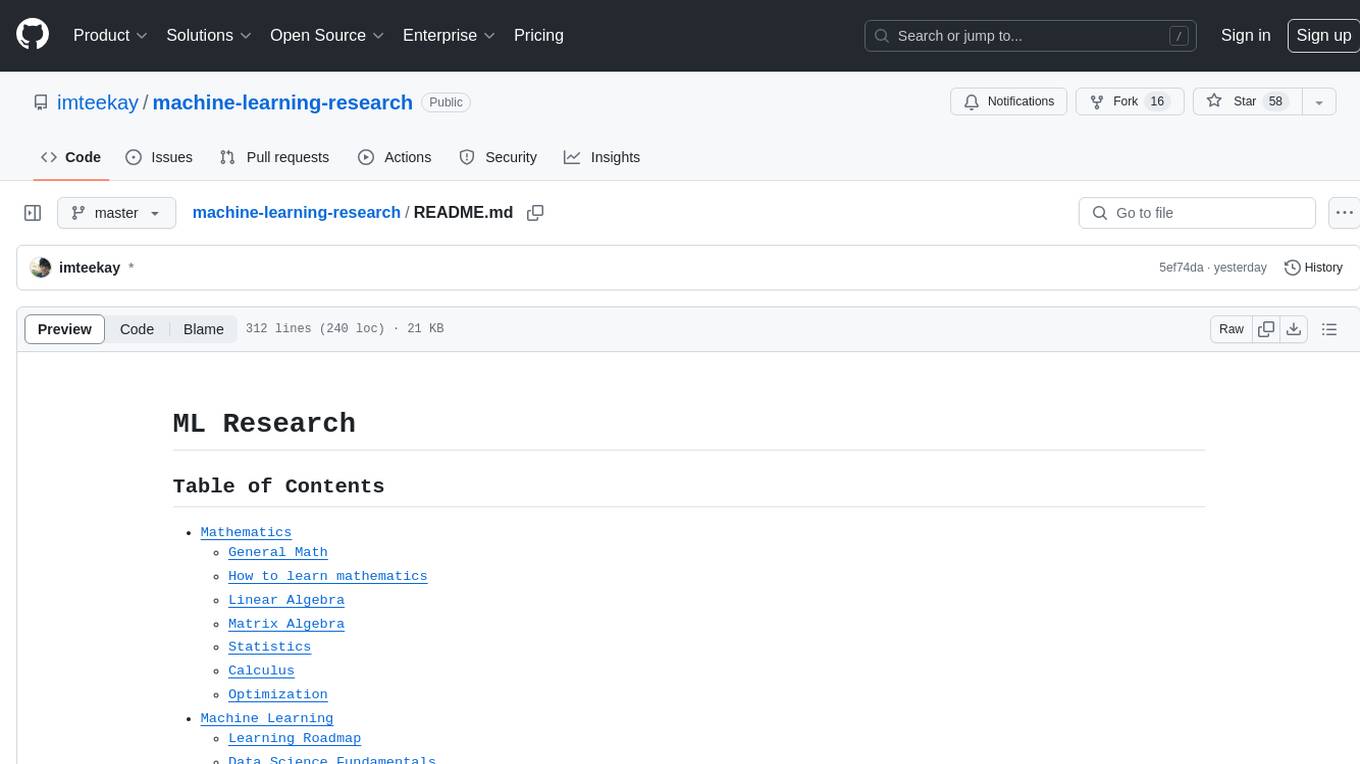
machine-learning-research
The 'machine-learning-research' repository is a comprehensive collection of resources related to mathematics, machine learning, deep learning, artificial intelligence, data science, and various scientific fields. It includes materials such as courses, tutorials, books, podcasts, communities, online courses, papers, and dissertations. The repository covers topics ranging from fundamental math skills to advanced machine learning concepts, with a focus on applications in healthcare, genetics, computational biology, precision health, and AI in science. It serves as a valuable resource for individuals interested in learning and researching in the fields of machine learning and related disciplines.
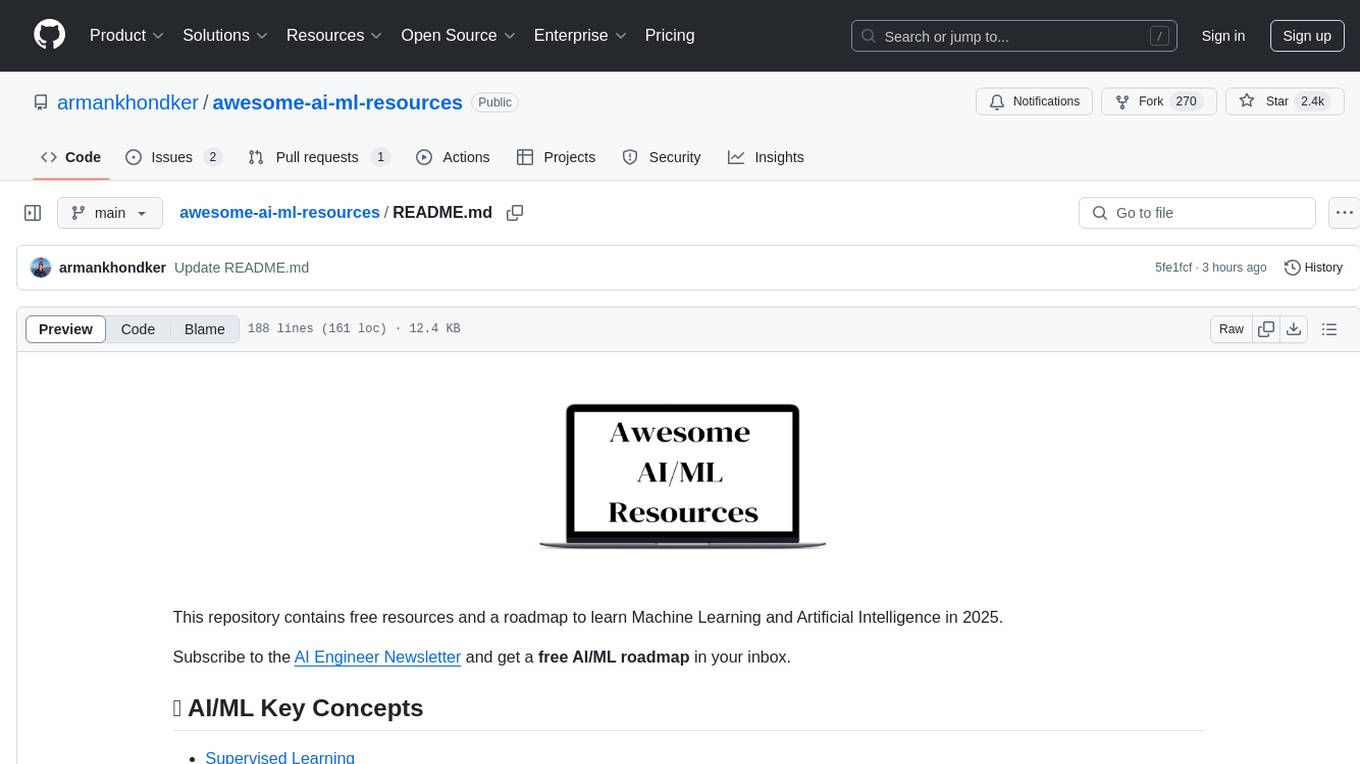
awesome-ai-ml-resources
This repository is a collection of free resources and a roadmap designed to help individuals learn Machine Learning and Artificial Intelligence concepts by providing key concepts, building blocks, roles, a learning roadmap, courses, certifications, books, tools & frameworks, research blogs, applied blogs, practice problems, communities, YouTube channels, newsletters, and must-read papers. It covers a wide range of topics from supervised learning to MLOps, offering guidance on learning paths, practical experience, and job interview preparation.
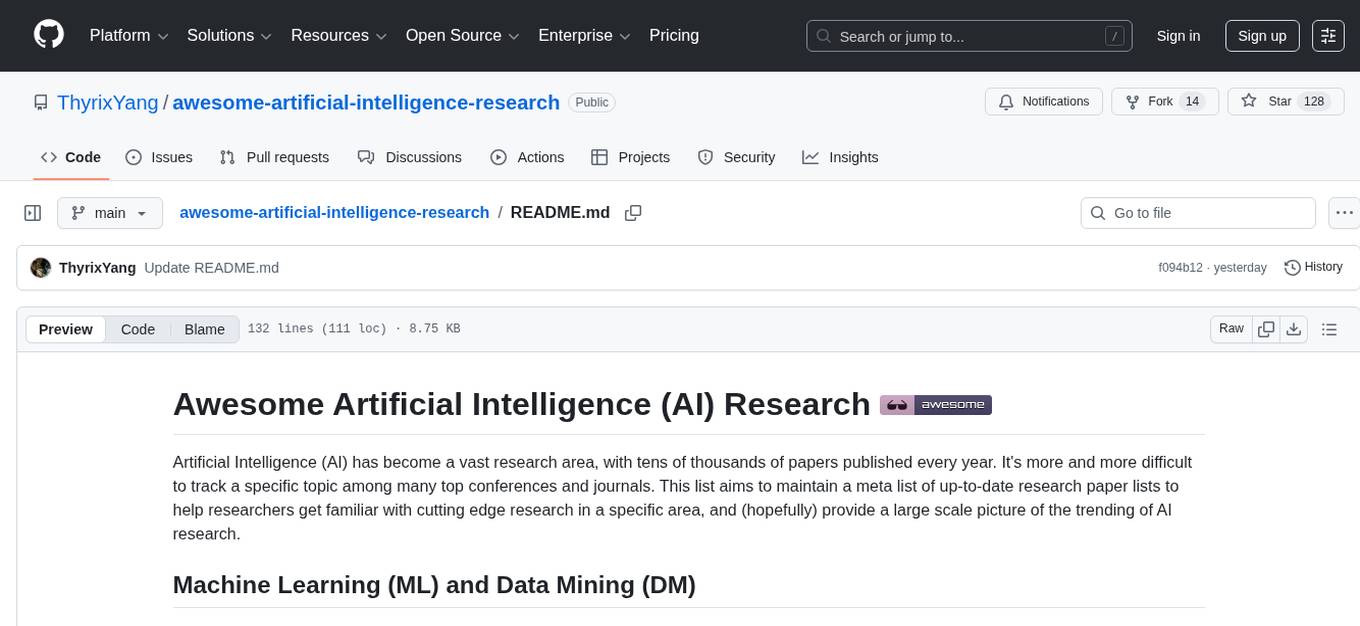
awesome-artificial-intelligence-research
The 'Awesome Artificial Intelligence Research' repository is a curated list of up-to-date research papers in the field of Artificial Intelligence (AI). It aims to help researchers stay informed about cutting-edge research trends and topics in AI by providing a comprehensive collection of research paper lists. The repository covers various subfields of AI, including Machine Learning, Data Mining, Computer Vision, Natural Language Processing, Audio & Speech, and other applications. It also includes tools for research such as public datasets and new paper recommendations.
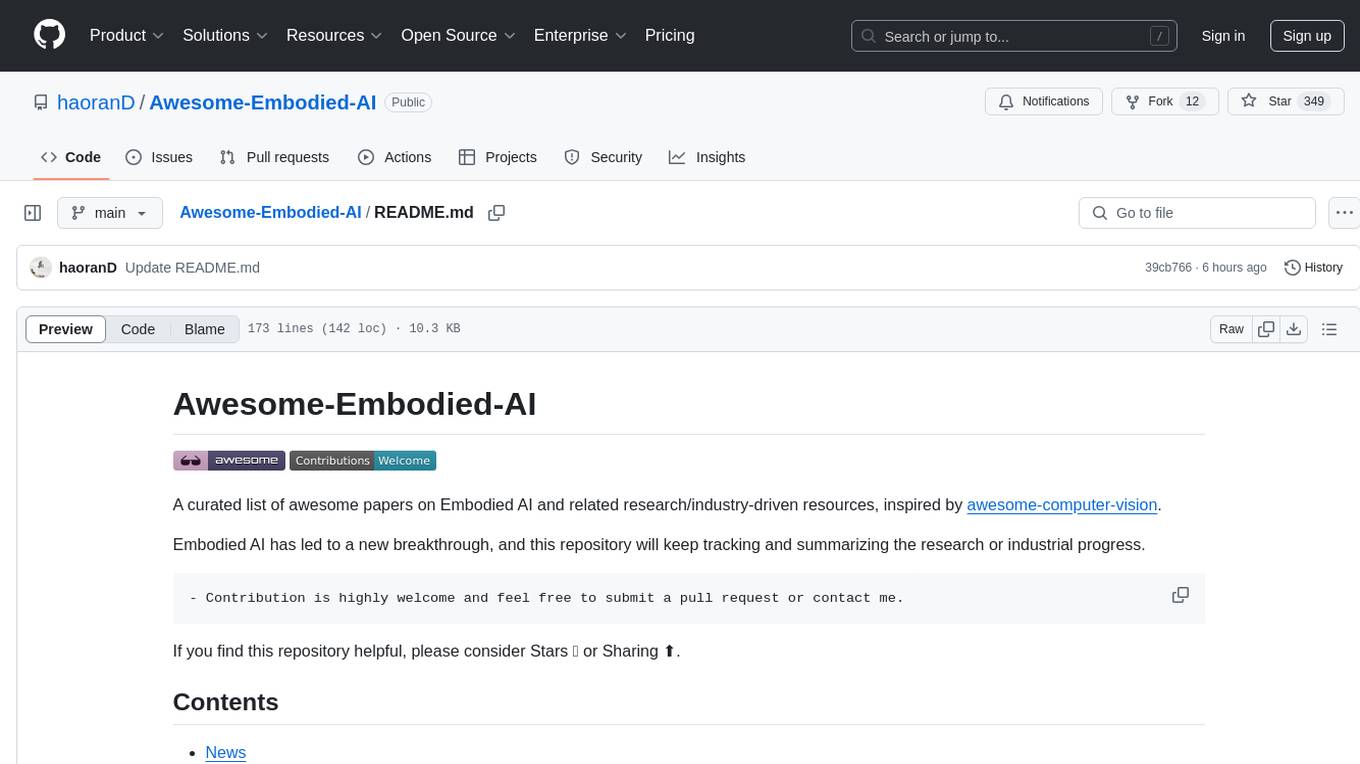
Awesome-Embodied-AI
Awesome-Embodied-AI is a curated list of papers on Embodied AI and related resources, tracking and summarizing research and industrial progress in the field. It includes surveys, workshops, tutorials, talks, blogs, and papers covering various aspects of Embodied AI, such as vision-language navigation, large language model-based agents, robotics, and more. The repository welcomes contributions and aims to provide a comprehensive overview of the advancements in Embodied AI.
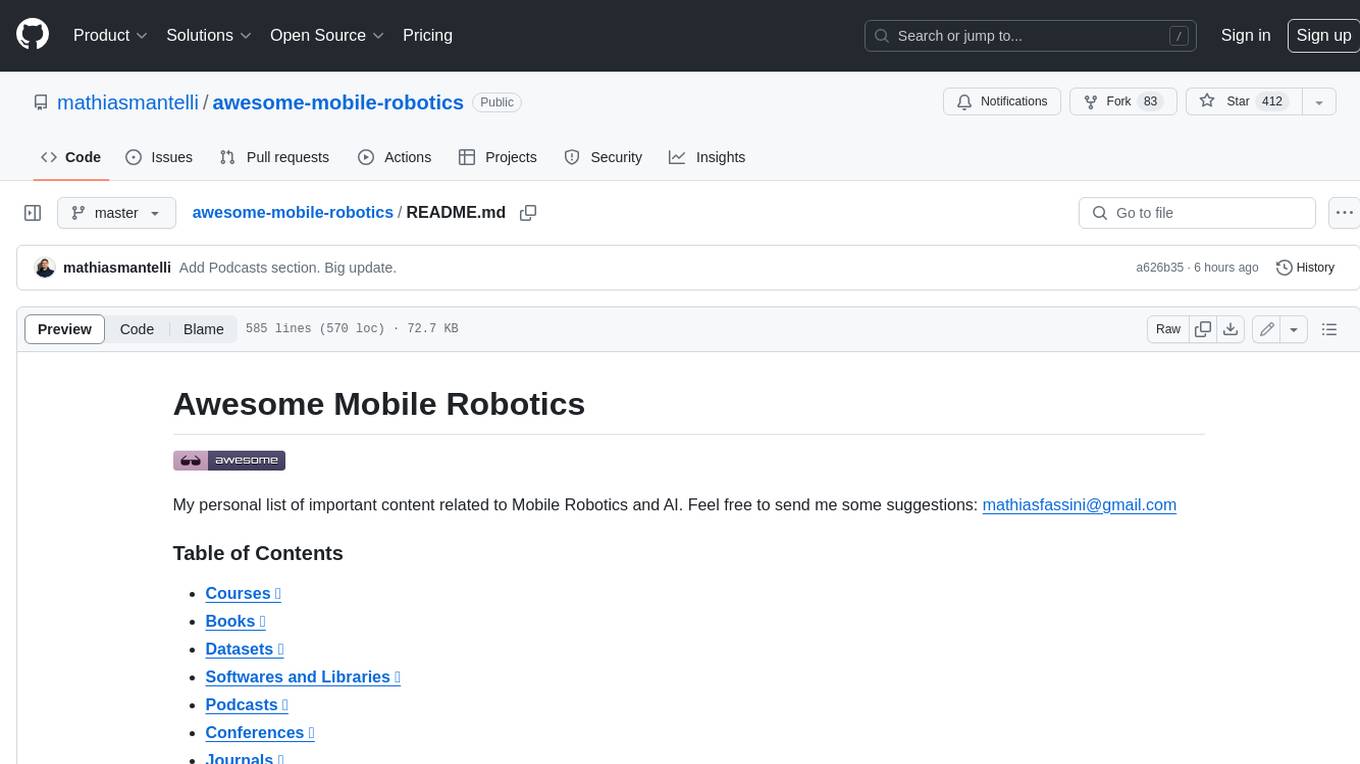
awesome-mobile-robotics
The 'awesome-mobile-robotics' repository is a curated list of important content related to Mobile Robotics and AI. It includes resources such as courses, books, datasets, software and libraries, podcasts, conferences, journals, companies and jobs, laboratories and research groups, and miscellaneous resources. The repository covers a wide range of topics in the field of Mobile Robotics and AI, providing valuable information for enthusiasts, researchers, and professionals in the domain.
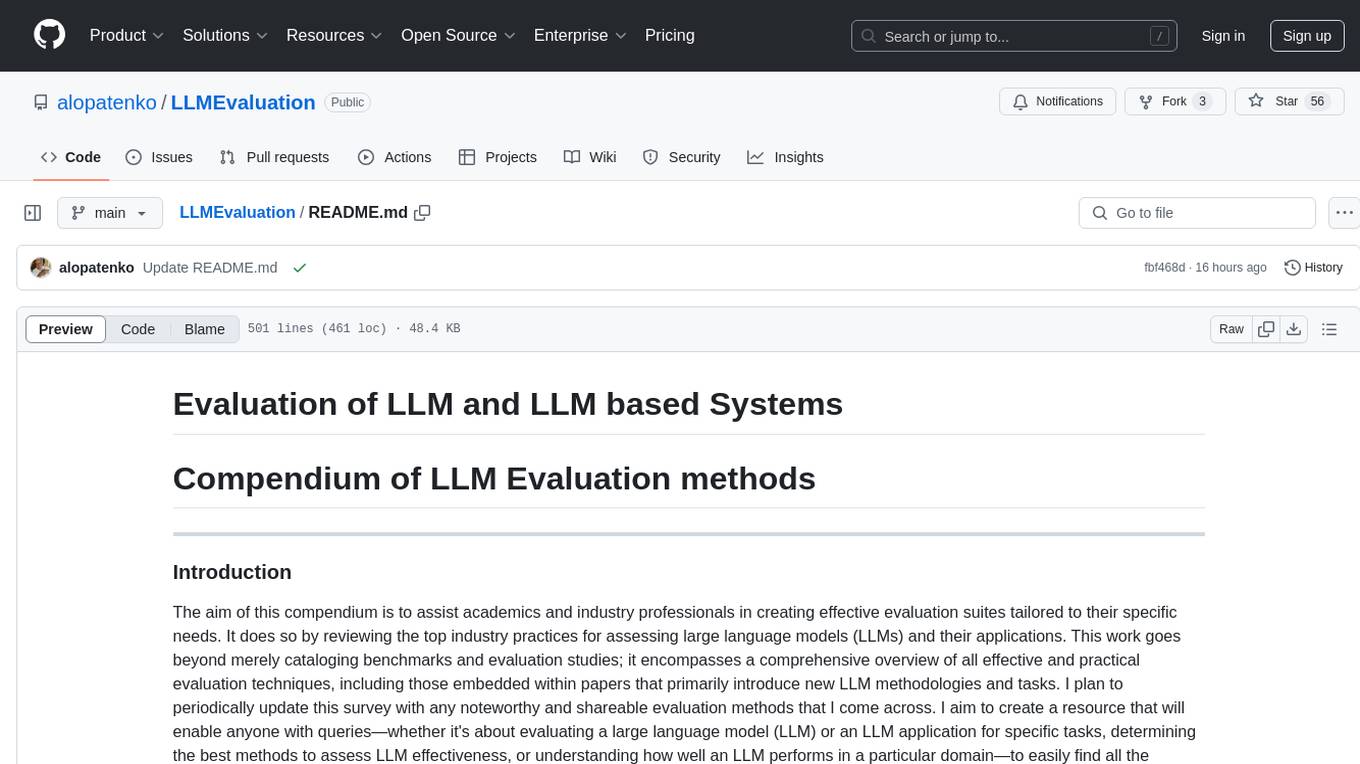
LLMEvaluation
The LLMEvaluation repository is a comprehensive compendium of evaluation methods for Large Language Models (LLMs) and LLM-based systems. It aims to assist academics and industry professionals in creating effective evaluation suites tailored to their specific needs by reviewing industry practices for assessing LLMs and their applications. The repository covers a wide range of evaluation techniques, benchmarks, and studies related to LLMs, including areas such as embeddings, question answering, multi-turn dialogues, reasoning, multi-lingual tasks, ethical AI, biases, safe AI, code generation, summarization, software performance, agent LLM architectures, long text generation, graph understanding, and various unclassified tasks. It also includes evaluations for LLM systems in conversational systems, copilots, search and recommendation engines, task utility, and verticals like healthcare, law, science, financial, and others. The repository provides a wealth of resources for evaluating and understanding the capabilities of LLMs in different domains.
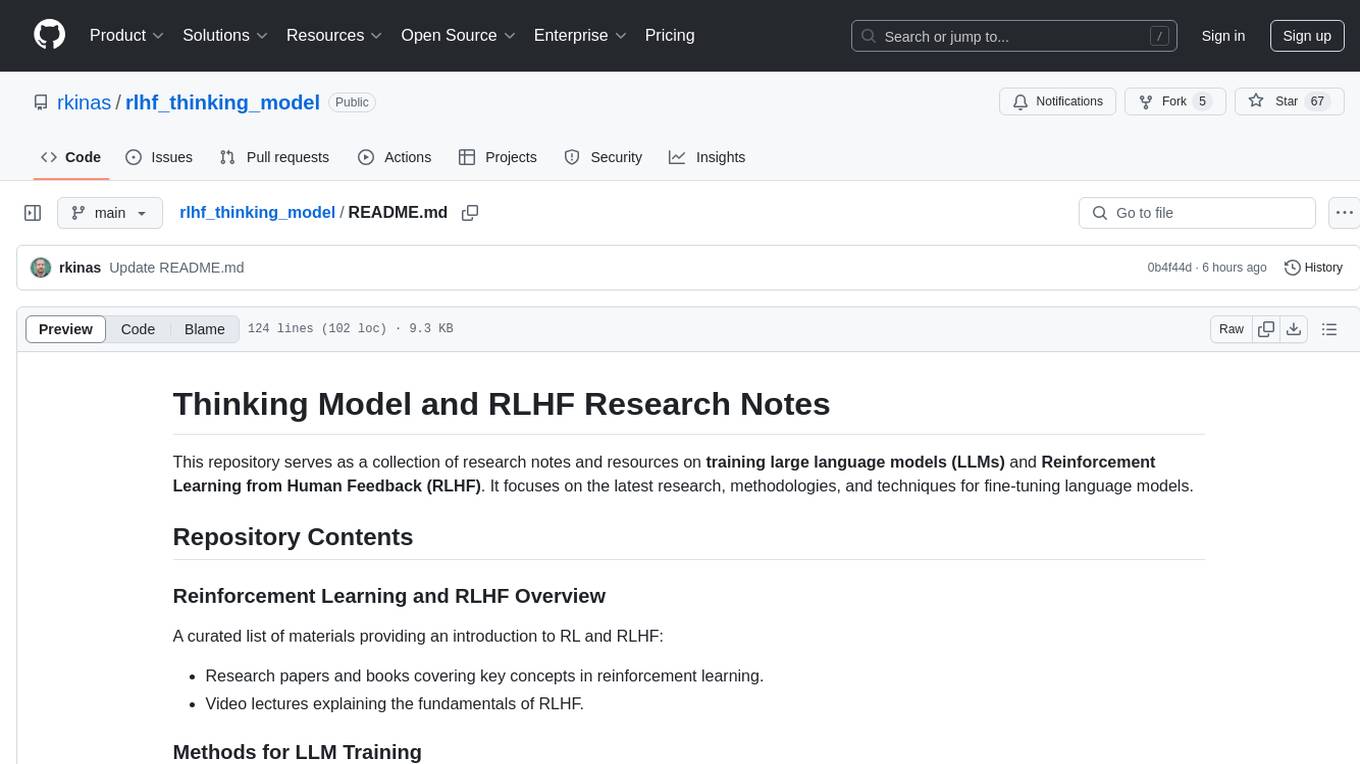
rlhf_thinking_model
This repository is a collection of research notes and resources focusing on training large language models (LLMs) and Reinforcement Learning from Human Feedback (RLHF). It includes methodologies, techniques, and state-of-the-art approaches for optimizing preferences and model alignment in LLM training. The purpose is to serve as a reference for researchers and engineers interested in reinforcement learning, large language models, model alignment, and alternative RL-based methods.
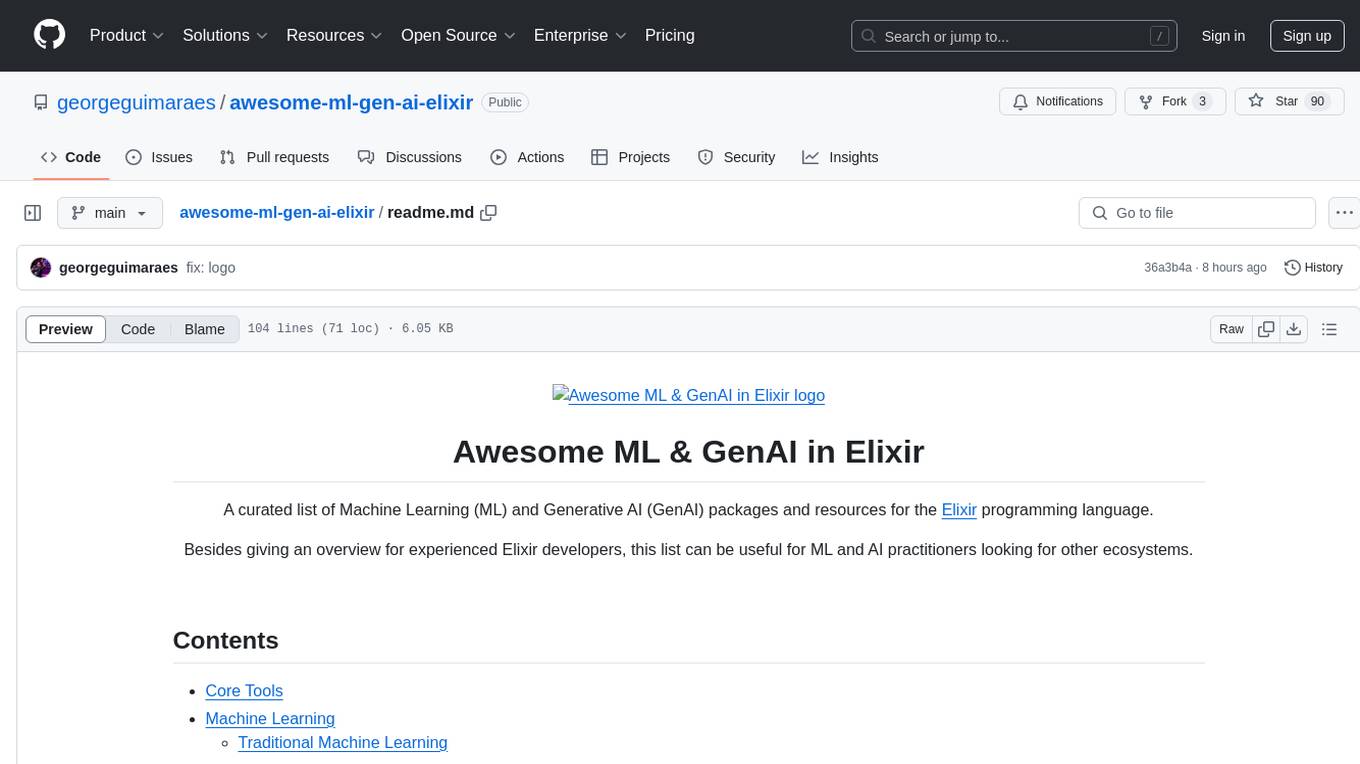
awesome-ml-gen-ai-elixir
A curated list of Machine Learning (ML) and Generative AI (GenAI) packages and resources for the Elixir programming language. It includes core tools for data exploration, traditional machine learning algorithms, deep learning models, computer vision libraries, generative AI tools, livebooks for interactive notebooks, and various resources such as books, videos, and articles. The repository aims to provide a comprehensive overview for experienced Elixir developers and ML/AI practitioners exploring different ecosystems.
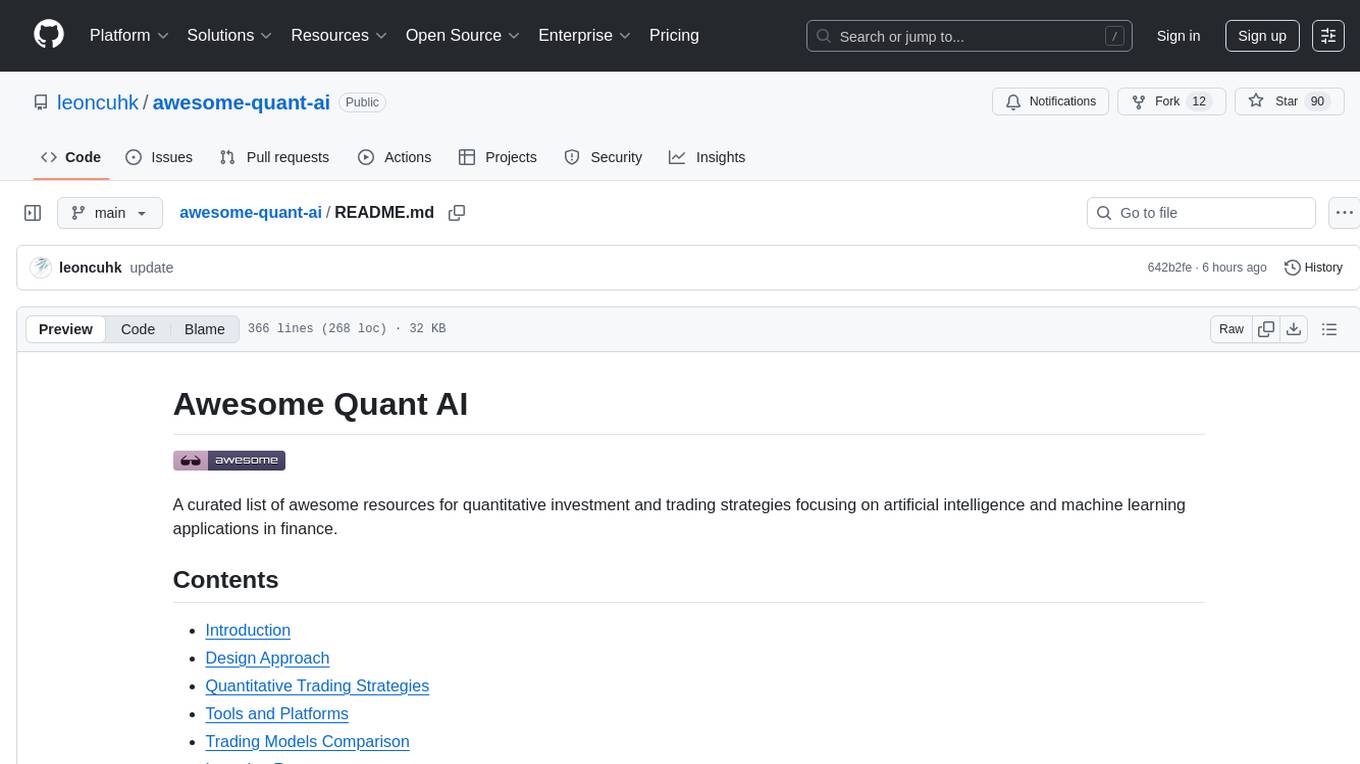
awesome-quant-ai
Awesome Quant AI is a curated list of resources focusing on quantitative investment and trading strategies using artificial intelligence and machine learning in finance. It covers key challenges in quantitative finance, AI/ML technical fit, predictive modeling, sequential decision-making, synthetic data generation, contextual reasoning, mathematical foundations, design approach, quantitative trading strategies, tools and platforms, learning resources, books, research papers, community, and conferences. The repository aims to provide a comprehensive resource for those interested in the intersection of AI, machine learning, and quantitative finance, with a focus on extracting alpha while managing risk in financial systems.
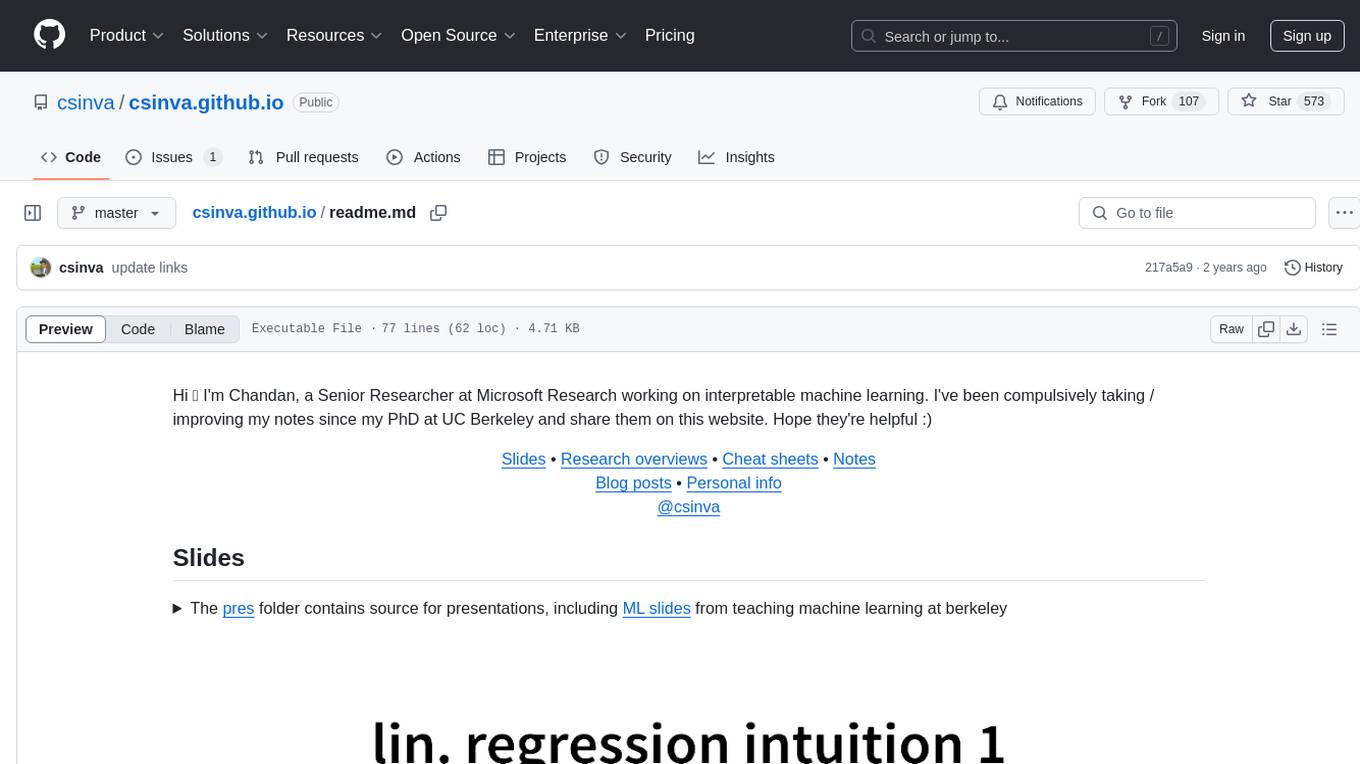
csinva.github.io
csinva.github.io is a repository maintained by Chandan, a Senior Researcher at Microsoft Research, focusing on interpretable machine learning. The repository contains slides, research overviews, cheat sheets, notes, blog posts, and personal information related to machine learning, statistics, and neuroscience. It offers resources for presentations, summaries of recent papers, cheat sheets for various courses, and posts on different aspects of machine learning and neuroscience advancements.
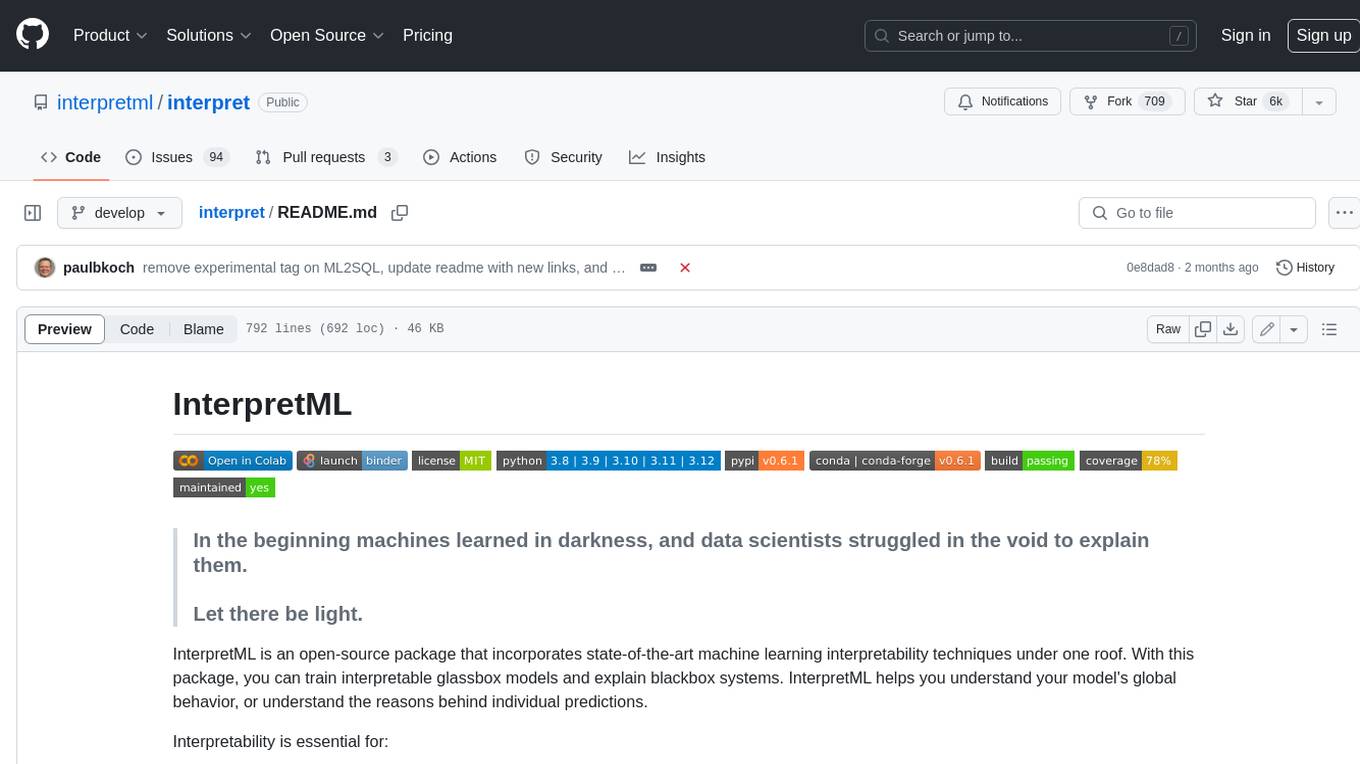
interpret
InterpretML is an open-source package that incorporates state-of-the-art machine learning interpretability techniques under one roof. With this package, you can train interpretable glassbox models and explain blackbox systems. InterpretML helps you understand your model's global behavior, or understand the reasons behind individual predictions. Interpretability is essential for: - Model debugging - Why did my model make this mistake? - Feature Engineering - How can I improve my model? - Detecting fairness issues - Does my model discriminate? - Human-AI cooperation - How can I understand and trust the model's decisions? - Regulatory compliance - Does my model satisfy legal requirements? - High-risk applications - Healthcare, finance, judicial, ...
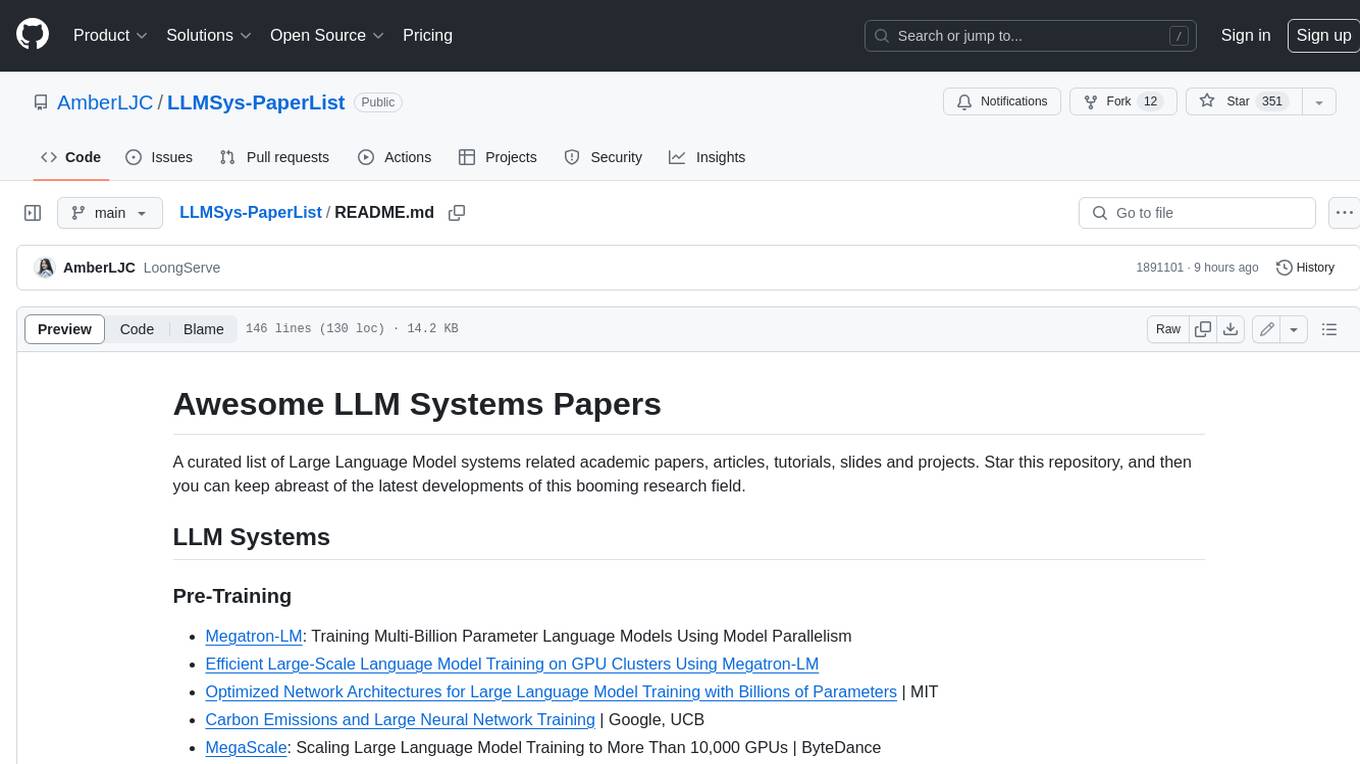
LLMSys-PaperList
This repository provides a comprehensive list of academic papers, articles, tutorials, slides, and projects related to Large Language Model (LLM) systems. It covers various aspects of LLM research, including pre-training, serving, system efficiency optimization, multi-model systems, image generation systems, LLM applications in systems, ML systems, survey papers, LLM benchmarks and leaderboards, and other relevant resources. The repository is regularly updated to include the latest developments in this rapidly evolving field, making it a valuable resource for researchers, practitioners, and anyone interested in staying abreast of the advancements in LLM technology.
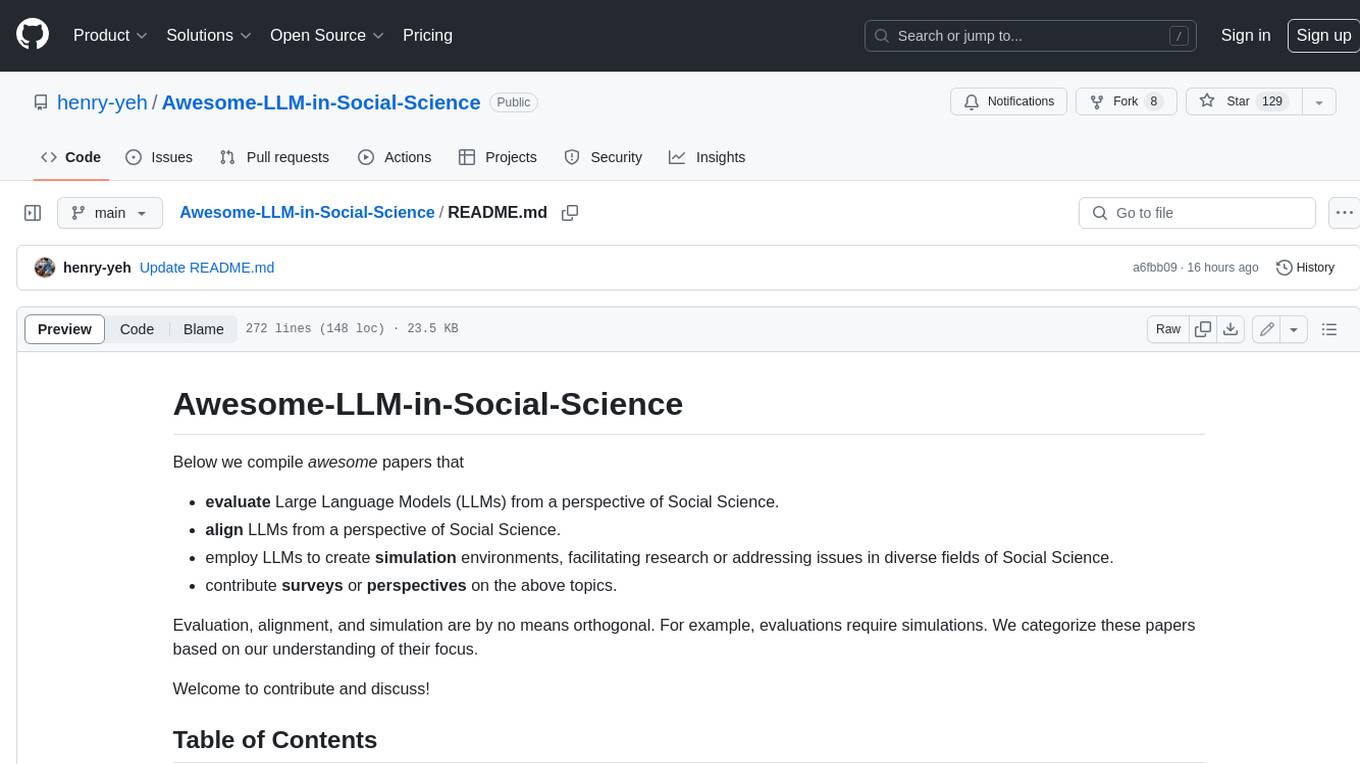
Awesome-LLM-in-Social-Science
This repository compiles a list of academic papers that evaluate, align, simulate, and provide surveys or perspectives on the use of Large Language Models (LLMs) in the field of Social Science. The papers cover various aspects of LLM research, including assessing their alignment with human values, evaluating their capabilities in tasks such as opinion formation and moral reasoning, and exploring their potential for simulating social interactions and addressing issues in diverse fields of Social Science. The repository aims to provide a comprehensive resource for researchers and practitioners interested in the intersection of LLMs and Social Science.
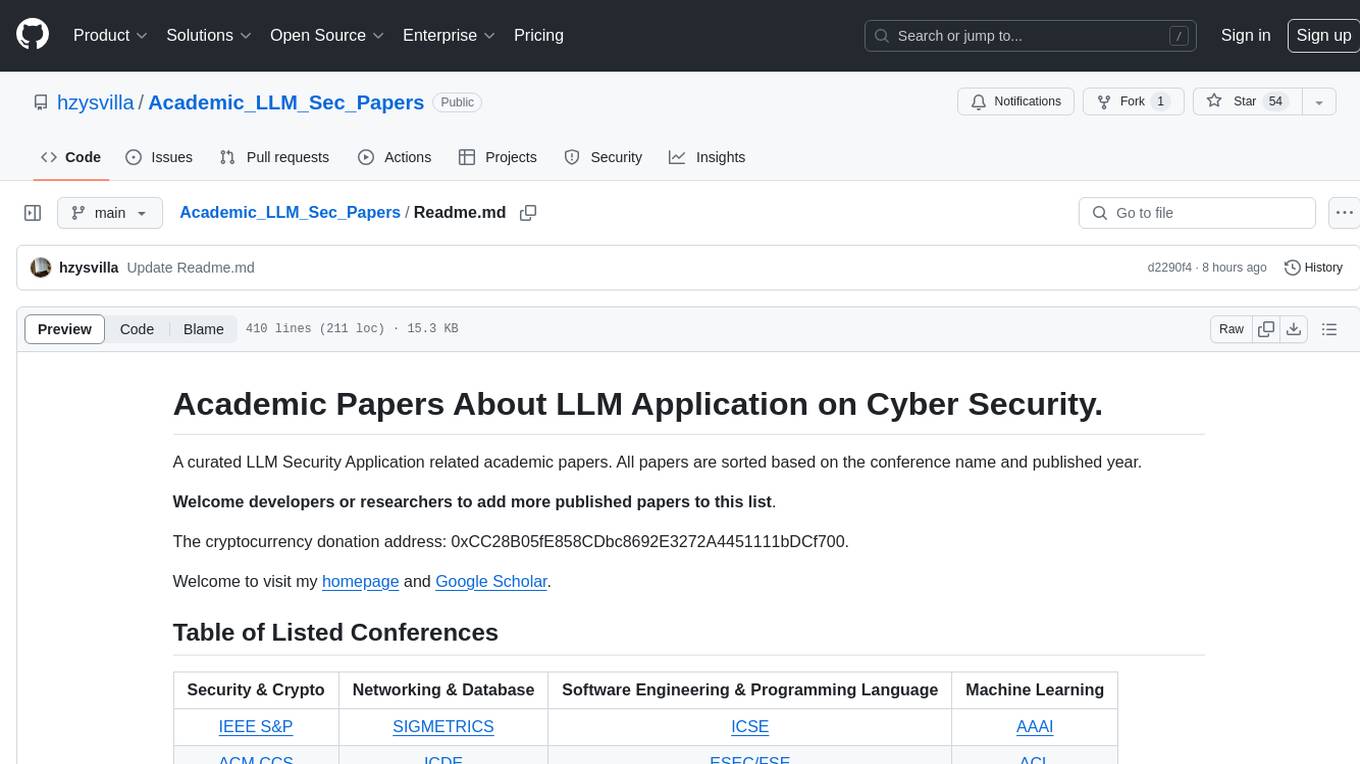
Academic_LLM_Sec_Papers
Academic_LLM_Sec_Papers is a curated collection of academic papers related to LLM Security Application. The repository includes papers sorted by conference name and published year, covering topics such as large language models for blockchain security, software engineering, machine learning, and more. Developers and researchers are welcome to contribute additional published papers to the list. The repository also provides information on listed conferences and journals related to security, networking, software engineering, and cryptography. The papers cover a wide range of topics including privacy risks, ethical concerns, vulnerabilities, threat modeling, code analysis, fuzzing, and more.
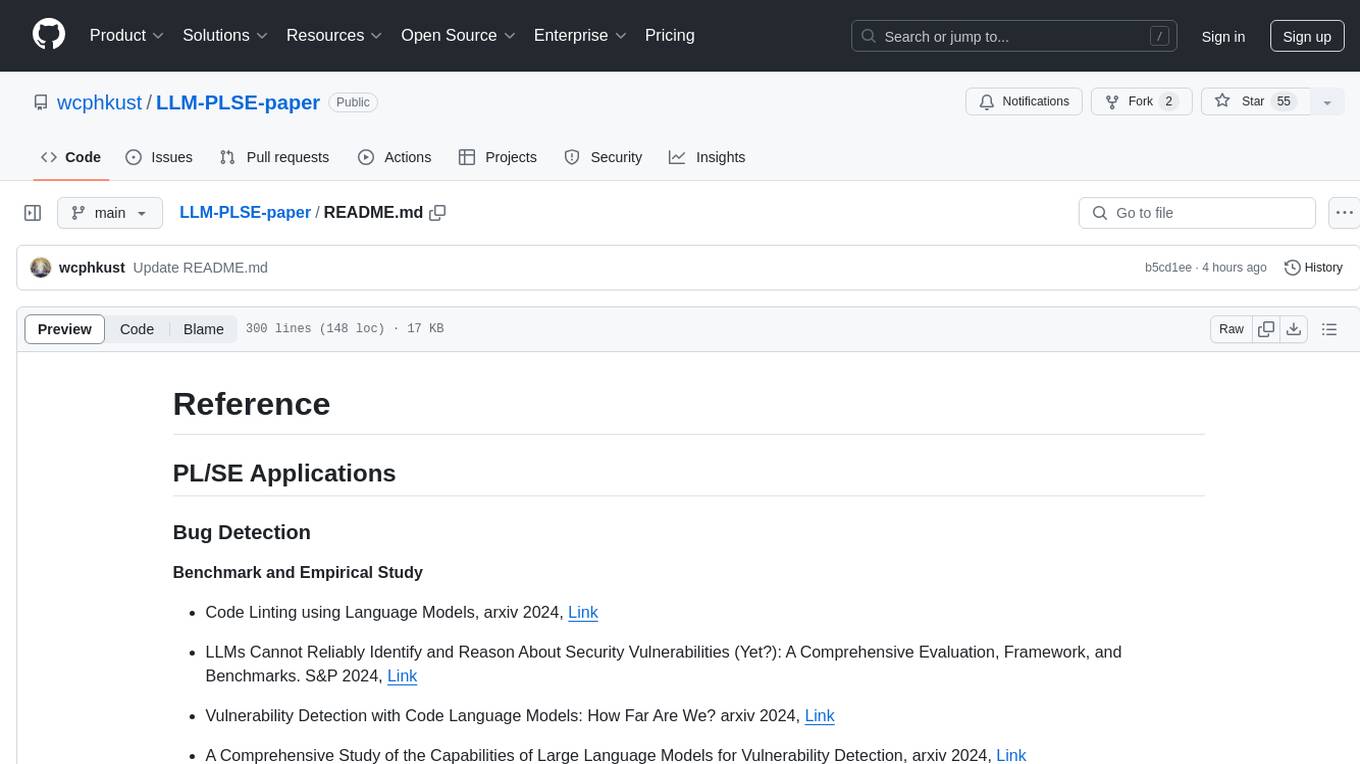
LLM-PLSE-paper
LLM-PLSE-paper is a repository focused on the applications of Large Language Models (LLMs) in Programming Language and Software Engineering (PL/SE) domains. It covers a wide range of topics including bug detection, specification inference and verification, code generation, fuzzing and testing, code model and reasoning, code understanding, IDE technologies, prompting for reasoning tasks, and agent/tool usage and planning. The repository provides a comprehensive collection of research papers, benchmarks, empirical studies, and frameworks related to the capabilities of LLMs in various PL/SE tasks.
For similar tasks

openunivcourses
OpenUnivCourses is a repository that provides free university courses in machine learning from top universities like MIT, Stanford, Berkeley, Carnegie Mellon, NYU, University of Michigan, University of Pennsylvania, University of Chicago, Purdue, Cornell, University of Oxford, and CalTech. The repository includes a wide range of courses covering topics such as deep learning, reinforcement learning, natural language processing, and more. Users can access lectures, notes, and videos from these prestigious institutions to enhance their knowledge and skills in the field of artificial intelligence and machine learning.

machine-learning-research
The 'machine-learning-research' repository is a comprehensive collection of resources related to mathematics, machine learning, deep learning, artificial intelligence, data science, and various scientific fields. It includes materials such as courses, tutorials, books, podcasts, communities, online courses, papers, and dissertations. The repository covers topics ranging from fundamental math skills to advanced machine learning concepts, with a focus on applications in healthcare, genetics, computational biology, precision health, and AI in science. It serves as a valuable resource for individuals interested in learning and researching in the fields of machine learning and related disciplines.
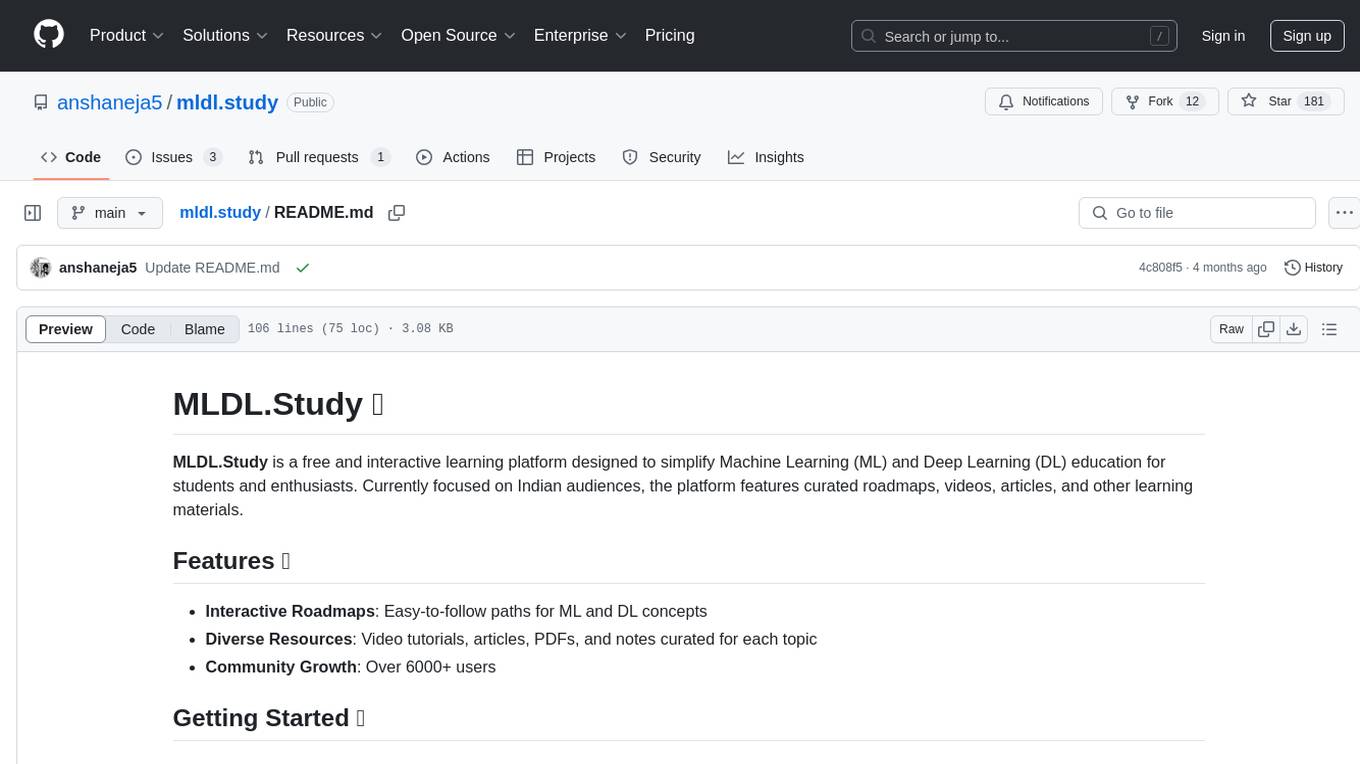
mldl.study
MLDL.Study is a free interactive learning platform focused on simplifying Machine Learning (ML) and Deep Learning (DL) education for students and enthusiasts. It features curated roadmaps, videos, articles, and other learning materials. The platform aims to provide a comprehensive learning experience for Indian audiences, with easy-to-follow paths for ML and DL concepts, diverse resources including video tutorials and articles, and a growing community of over 6000 users. Contributors can add new resources following specific guidelines to maintain quality and relevance. Future plans include expanding content for global learners, introducing a Python programming roadmap, and creating roadmaps for fields like Generative AI and Reinforcement Learning.
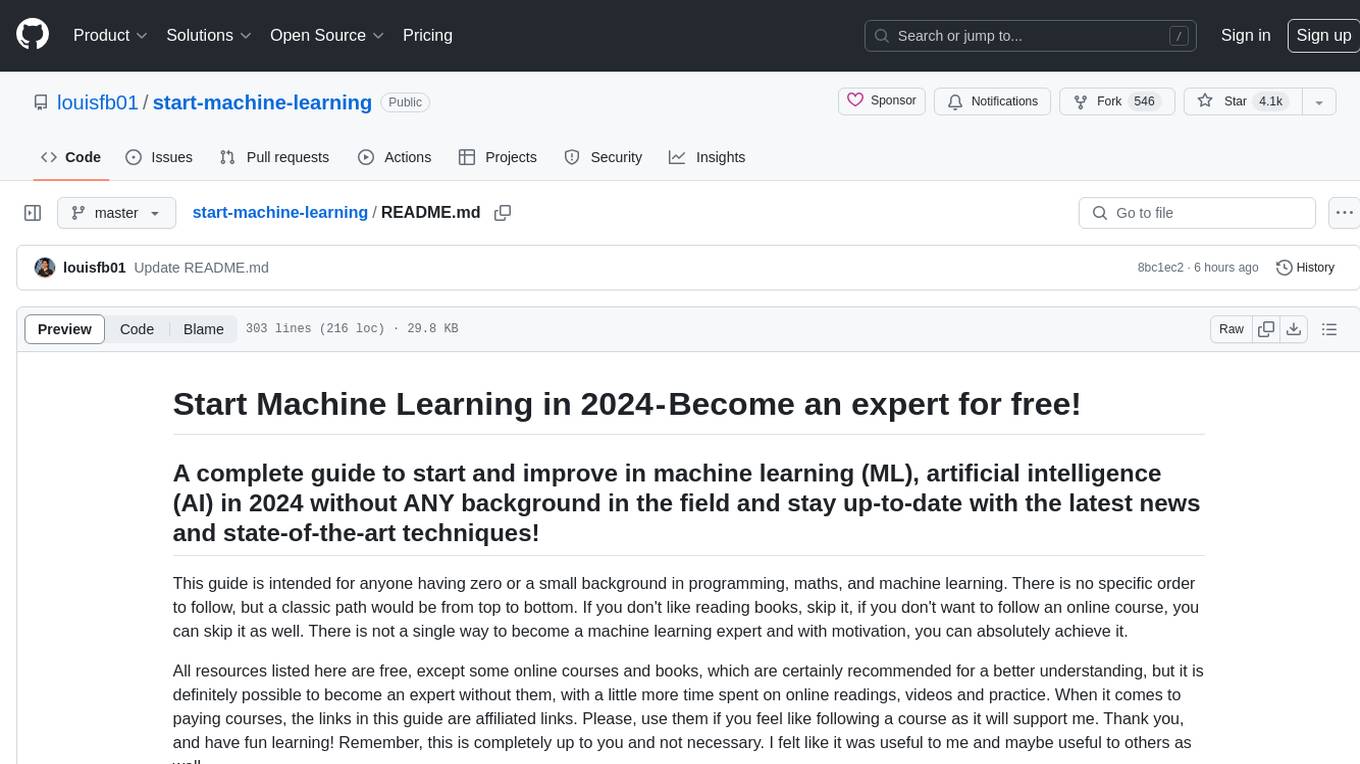
start-machine-learning
Start Machine Learning in 2024 is a comprehensive guide for beginners to advance in machine learning and artificial intelligence without any prior background. The guide covers various resources such as free online courses, articles, books, and practical tips to become an expert in the field. It emphasizes self-paced learning and provides recommendations for learning paths, including videos, podcasts, and online communities. The guide also includes information on building language models and applications, practicing through Kaggle competitions, and staying updated with the latest news and developments in AI. The goal is to empower individuals with the knowledge and resources to excel in machine learning and AI.
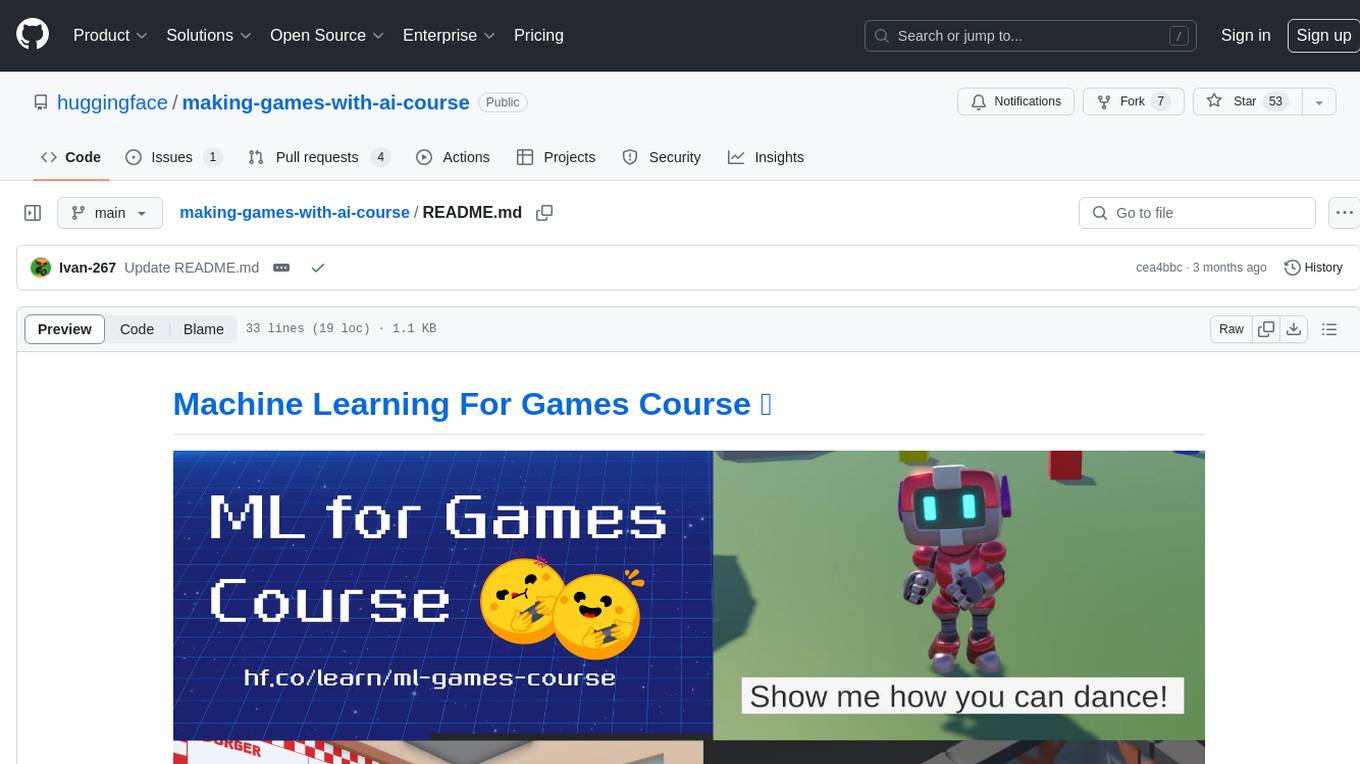
making-games-with-ai-course
This repository hosts the Machine Learning for Games Course, providing mdx files and notebooks for learning. The course covers various topics related to applying machine learning techniques in game development. It offers a syllabus and resources for users to sign up and access the content for free. The project is maintained by Thomas Simonini and is available on GitHub for citation in publications.
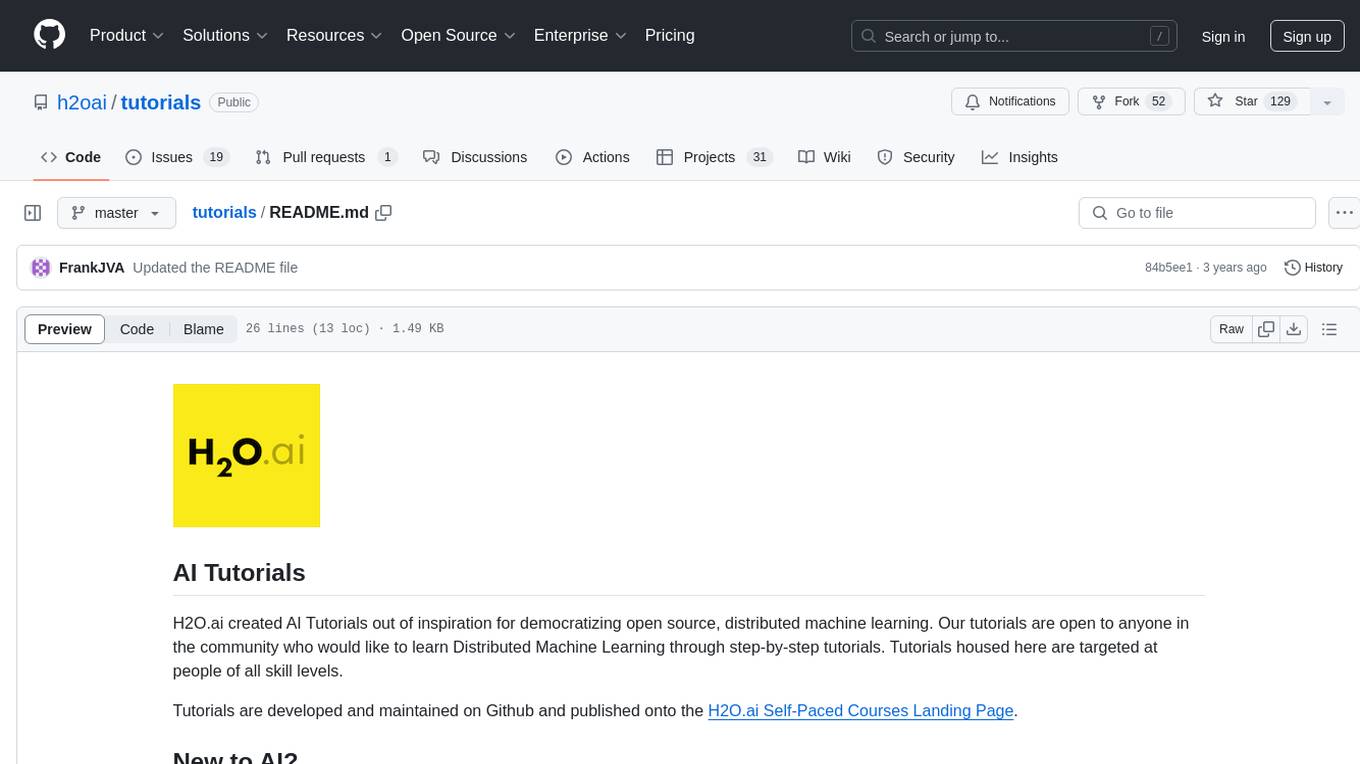
tutorials
H2O.ai's AI Tutorials aim to democratize open source, distributed machine learning by providing step-by-step tutorials for individuals of all skill levels. These tutorials are developed and maintained on Github and published on the H2O.ai Self-Paced Courses Landing Page. Users can begin their AI journey by exploring the tutorials available on the landing page and can contribute by fixing issues, updating tutorials, or creating new ones.
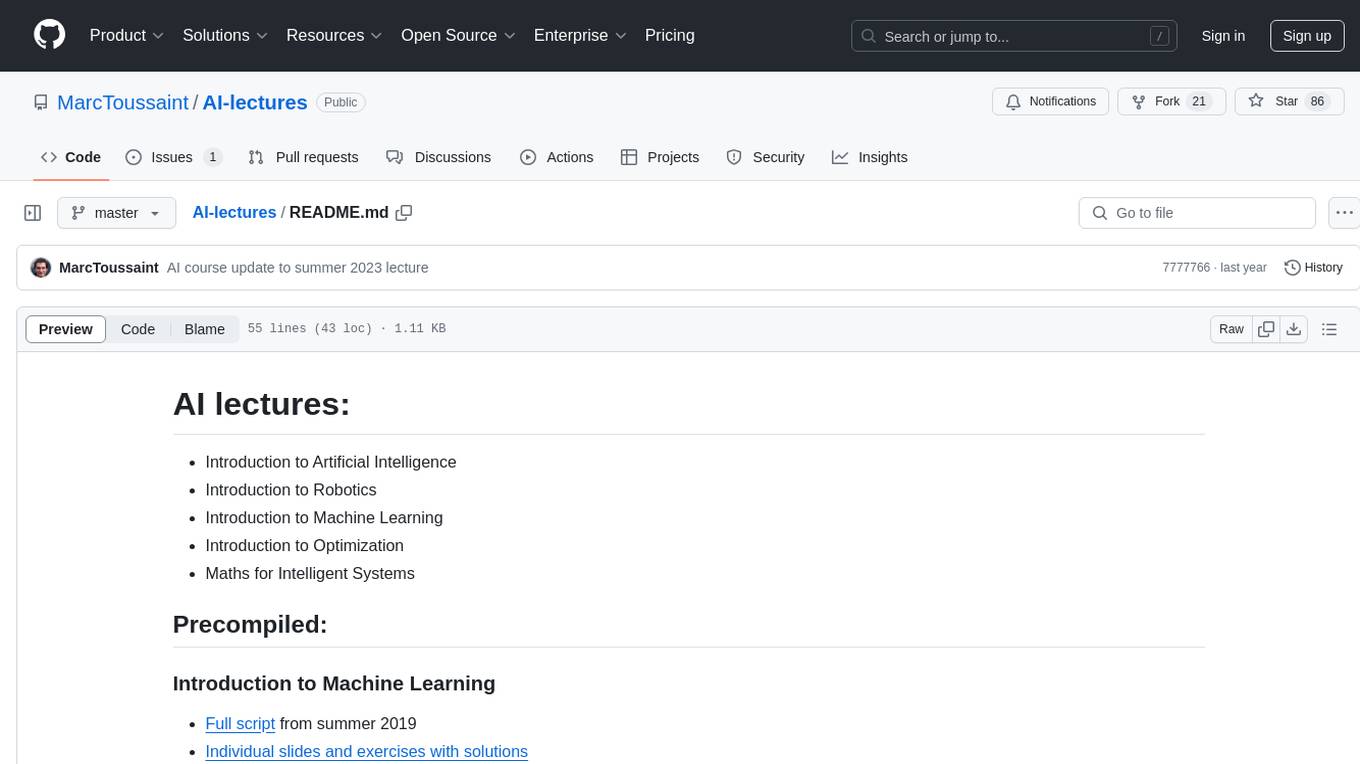
AI-lectures
AI-lectures is a repository containing educational materials on various topics related to Artificial Intelligence, including Machine Learning, Robotics, and Optimization. It provides full scripts, slides, and exercises with solutions for different lectures. Users can compile the materials into PDFs for easy access and reference. The repository aims to offer comprehensive resources for individuals interested in learning about AI and its applications in intelligent systems.
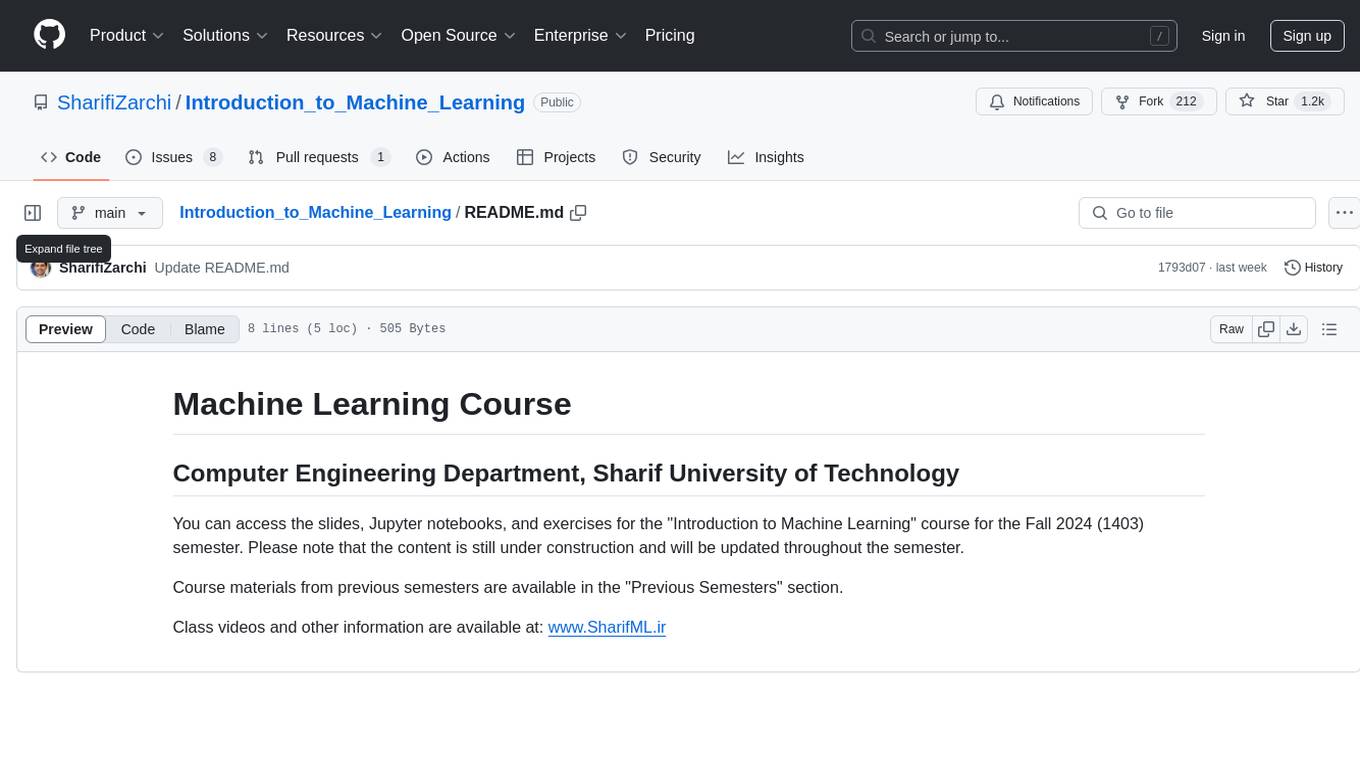
Introduction_to_Machine_Learning
This repository contains course materials for the 'Introduction to Machine Learning' course at Sharif University of Technology. It includes slides, Jupyter notebooks, and exercises for the Fall 2024 semester. The content is continuously updated throughout the semester. Previous semester materials are also accessible. Visit www.SharifML.ir for class videos and additional information.
For similar jobs

weave
Weave is a toolkit for developing Generative AI applications, built by Weights & Biases. With Weave, you can log and debug language model inputs, outputs, and traces; build rigorous, apples-to-apples evaluations for language model use cases; and organize all the information generated across the LLM workflow, from experimentation to evaluations to production. Weave aims to bring rigor, best-practices, and composability to the inherently experimental process of developing Generative AI software, without introducing cognitive overhead.

LLMStack
LLMStack is a no-code platform for building generative AI agents, workflows, and chatbots. It allows users to connect their own data, internal tools, and GPT-powered models without any coding experience. LLMStack can be deployed to the cloud or on-premise and can be accessed via HTTP API or triggered from Slack or Discord.

VisionCraft
The VisionCraft API is a free API for using over 100 different AI models. From images to sound.

kaito
Kaito is an operator that automates the AI/ML inference model deployment in a Kubernetes cluster. It manages large model files using container images, avoids tuning deployment parameters to fit GPU hardware by providing preset configurations, auto-provisions GPU nodes based on model requirements, and hosts large model images in the public Microsoft Container Registry (MCR) if the license allows. Using Kaito, the workflow of onboarding large AI inference models in Kubernetes is largely simplified.

PyRIT
PyRIT is an open access automation framework designed to empower security professionals and ML engineers to red team foundation models and their applications. It automates AI Red Teaming tasks to allow operators to focus on more complicated and time-consuming tasks and can also identify security harms such as misuse (e.g., malware generation, jailbreaking), and privacy harms (e.g., identity theft). The goal is to allow researchers to have a baseline of how well their model and entire inference pipeline is doing against different harm categories and to be able to compare that baseline to future iterations of their model. This allows them to have empirical data on how well their model is doing today, and detect any degradation of performance based on future improvements.

tabby
Tabby is a self-hosted AI coding assistant, offering an open-source and on-premises alternative to GitHub Copilot. It boasts several key features: * Self-contained, with no need for a DBMS or cloud service. * OpenAPI interface, easy to integrate with existing infrastructure (e.g Cloud IDE). * Supports consumer-grade GPUs.

spear
SPEAR (Simulator for Photorealistic Embodied AI Research) is a powerful tool for training embodied agents. It features 300 unique virtual indoor environments with 2,566 unique rooms and 17,234 unique objects that can be manipulated individually. Each environment is designed by a professional artist and features detailed geometry, photorealistic materials, and a unique floor plan and object layout. SPEAR is implemented as Unreal Engine assets and provides an OpenAI Gym interface for interacting with the environments via Python.

Magick
Magick is a groundbreaking visual AIDE (Artificial Intelligence Development Environment) for no-code data pipelines and multimodal agents. Magick can connect to other services and comes with nodes and templates well-suited for intelligent agents, chatbots, complex reasoning systems and realistic characters.